|
||||
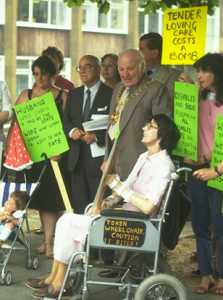 Photographs
from the demo Photographs
from the demo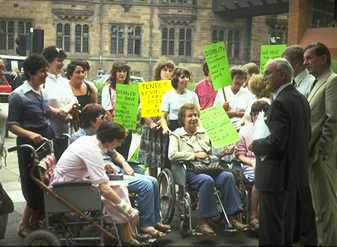 |
||||
| Here follow some examples of the sort of issues she was campaigning about reproduced from the "Coventry Evening Telegraph" | ||||
Disabled wait on vote for rightsBy Caroline Pritchard
|
||||
An ammendment to the Chroncially Sick and Disabled Act was eventually passed but many of its provisions lie on the shelf never fully enacted. Long before she aquired her famous squirell, she was in the news campaigning for better access, as in this feature I have reproduced below |
||||
Making life easier for wheelchair users.A little thought can open up new doors.by Peter Walters
Mary has to laugh. In a wheelchair you get used to such thoughtlessness, even from those who ought to know better. It's still an able-bodied world out there. Those wheo need wheelchairs to get around - and there are at least 3000 of them in Coventry - are reminded of that all the time. Rheumatoid arthritis has confined Mary Arnold to a wheelchair for more than 12 months now. A former cook supervisor with the school meals' service, she had to give up her job three years ago. These days she's a volunteer working on disability rights and a leading campaigner with the Coventry Council for the Disabled. LoweredThe council is now preparing its first access guide for disabled peole using the city centre. It hopes to publish next year, if it can find the necessary cash from somewhere. In mary Arnold's view, Coventry rates as "reasonable" when it comes to thinking about disabled people. There are plenty of places much worse. Even so, for anybody in a wheelchair an expedition into the city centre reveals its share of obstacles and no-go areas. From Mary's home in Starley Road, the route into the precincts is an easy one. There are no steep slopes and the kerbs have been lowered at the Queen Victoria Road junction, making it safe and easy to use. We encounter the first snag at a dry cleaner's in City ARcade. The step is too high for Mary's chair to tackle. "My electric wheelchair is supposed to give me independence, " she says, "but theres's no way I could get into there without help." It's the same story at a trendy clothes shop just off Broadgate. Steps installed in a major re-fit last year have made it virtually impossible for wheelchair-borne customers to use. Ironically enough before the refit it was easily accessible. "That should not be happening these days," says Mary, and it's why we're keen to have a voice at the planning stage of building schemes. A moment's thought would have eliminated the problem. "Perhaps they thought that people in wheelchairs wouldn't use such a shop. But there are plenty of young disabled people around. "We don't want to have to rely on the kindness of others to gain access to shops. And what applies to us also applies to mums with prams and pushchairs." The Chronically Sick and Disabled (Amendment) Bill, put before Parliament a year ago, might have instilled a new awareness amon shops and businesses, says Mary. But it was voted out. Instead, the irritating and the down right obstructive remain. Two banks in High Street are completely out of bounds - too many steps. At Woolworths, the gap between the ground floor cash desks is too small to take Mary's wheelchair. In Tesco, there's an awkward turnstile to get past and a cigarette counter so high it forces Mary to stretch painfully up, half out of her chair. "It makes me feel like Alice in Wonderland, she mutters. "I now know what it feels like to be a small child." The picture's not all bleak. Working closely with disabled groups, the city engineer's department is carrying out a programme to lower kerbs around the central shopping area. At Hertford Street Post Office, scene of protests in the past because of its inacccesibility to the disabled, an officer from the city architect's department is measuring up for a ramp that will be built next year. Standard telephone boxes have long been out of bounds to wheelchairs but the new open kiosks in the central precinct are an improvement. At least Mary is able to get close enough to use the phone, although she'd like a lever to make it easier to put her money in. It's time for refreshment and we head for British Home Stores. From the ground floor it's a service lift ride up to the restaurant. The staff are prompt and helpful but Mary has to negotiate her way through crowded stock rooms and the kitchen to reach the restaurant. The alternative approach is to use the steep precinct ramps, not a pleasant experience for someone in a wheelchair on a wet day. "I wish big stores all had public lifts," says Mary, "Although I appreciate that it would be expensive." At least here she's able to move a chair and sit properly at the table. In eating places where chairs and tables are fixed she often finds herself forced to block gangways. That's something that cinemas in the city will not allow her to do. They insist she uses their own seats, putting forward the excuse that every disabled person has come to know well - "fire regulations." As she propels herself round the central prec incts, Mary attracts considerable interest from other shoppers. Not many pass by without a look, furtive in some cases. AttitudeAt least on this occasion she hasn't had to listen to "Oh isn't it a shame," uttered within earshot. The able-bodied public's attitude to someone in a wheelchair may be generally sympathetic but too often it's unconsciously cruel. Many times Mary's sat boiling with rage as well-meaning people talk about but not to her, as if she were incapable of reasoned response. To test this out, I push her into a newsagent's shop. The staff ignore me and talk directly to her, treating her as just another customer. It doesn't always happen that way. In the past Mary's been patted on the head like a small dog and even handed a toy balloon as if she were a small child. Until disabled people have a bigger place in the scheme of things that will continue to happen |
||||
 Mary's efforts did ensure some changes. The Council house was eventually made accessible throught the front door and one of the banks in the previous article was eventualy ramped. Mary was on hand to celebrate the fact. |
||||
Going to the
bank made easier
|
||||
Back in 1984, the newly formed Council of Disabled People was the subject of a feature. Mary's cat seemed to be focus of more attention than her in the picture! |
||||
By MELANIE KNIGHT A DISABLED widow is desperate to find new premises for the charity she runs from her tiny bedroom in Coventry. Stacks of papers and files are crammed into a corner of 51-year-old Mary Arnold's 10ft by 12ft downstairs bedroom in Starley Road. She is chairman of Coventry Council for the Disabled which was set up two years ago to Provide information on the needs of handicapped people and to push for adequate facilities for them. Mary Arnold, who has suffered from rheumatoid arthritis and asthma for more than four years is desperate for a new base Increasing Even the charity's photocopier is two miles away at Whitmore Park school in Coventry because there is no room at her home and material has to be posted for duplication. And now the charity, already pushed for space, faces another setback Each Wednesday Mrs Arnold and her 29 year old son Laurence have a desk at the information centre in Broadgate to help and advise on the problems of the handicapped. But when the centre moves next Year to the new central library, the former Tiffany's ballroom in Smithford Way, there will be no room for the Organisation. So all business will have to be run from that little bedroom - unless a new base is found. The charity has a committee of 20, two smaller sub committees and an increasing membership. It uses a hall for meetings, which are attended by about 50 People but paperwork and a Computer are stored in the bedroom. Committee member Mr Arnold, who is unemployed lives in Broad Park Rd, Bell Green, but travels daily to look after his mother, who uses crutches indoors and a wheelchair when she is out. He said.- "We have been offered a few properties but they are all unsuitable for disabled people. Often there are steps or the buildings would cost too much to repair and adapt. We can't be stationed above a shop for instance, because we would be inaccessible to disabled people." The Arnolds have approached the Coventry city council's homes and property services department and the health authority, but each time suggested sites have proved inadequate, Income The charity is funded by members' subscriptions and private donations, helped by a recent £200 grant from the health authority. But that income barely covers the costs of a quarterly newsletter, travelling, the telephone bill and other essential items said Mr Arnold. Ken Lomas director of the council's homes and property services departnent, said: "We have been discussing Mrs Arnold's problems with-her and we are aware of her needs "We are not immediately in a position to find accommodation for her, "We are looking at our own accommodation to find things for her there and we also have list of all office accommodation in the city." |
||||
| Years later Mary was still working from home as shown by a later article from the Inner City Task Force magazine | ||||
Computer Friendly How computers changed the lives of two women (Task Force Express September 1992)
|
||||
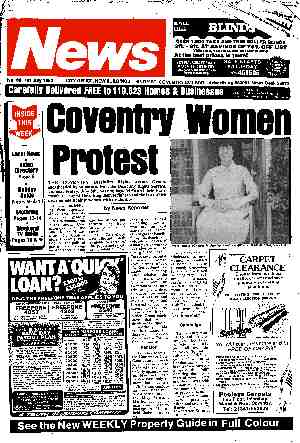



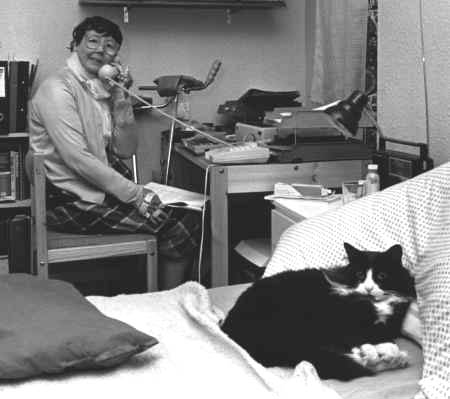
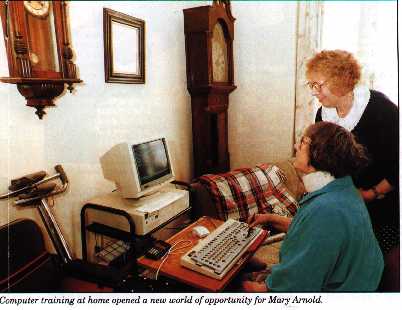 INDERJIT
MANN is an active, lively Asian mother of three
who has just battled her way back into the jobs
market after an eight year break to concentrate
on her young family.
INDERJIT
MANN is an active, lively Asian mother of three
who has just battled her way back into the jobs
market after an eight year break to concentrate
on her young family.